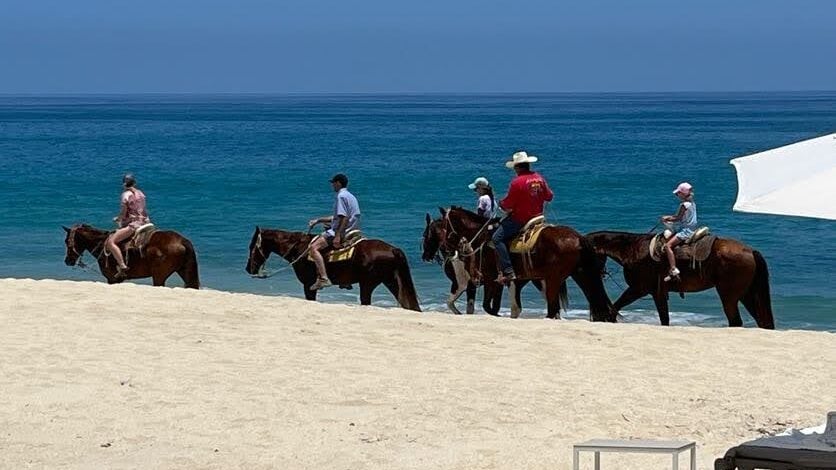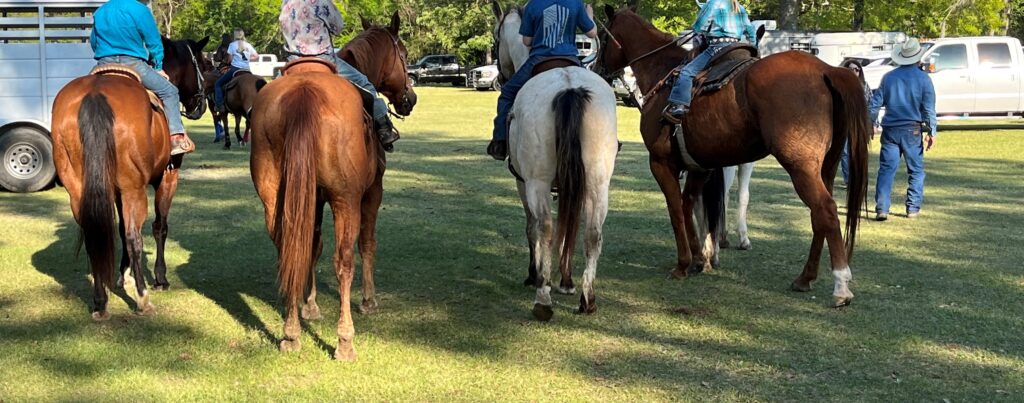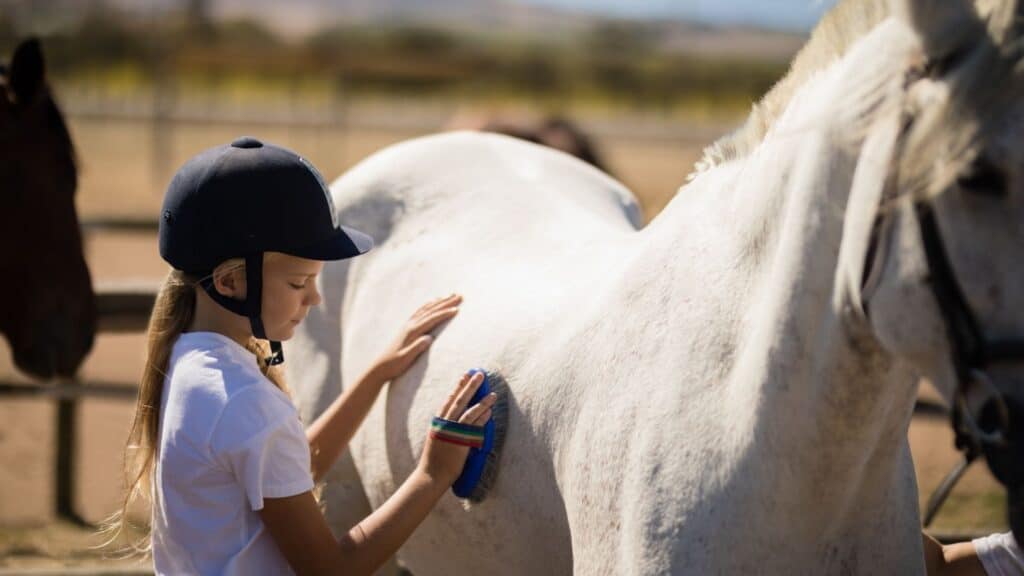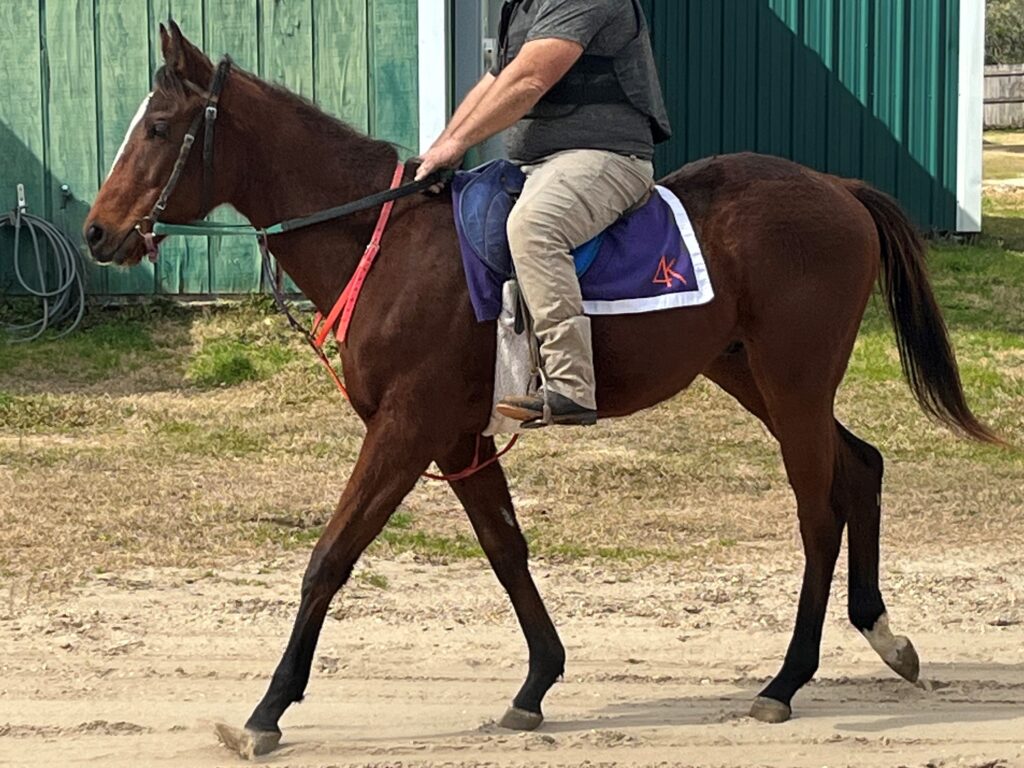Last updated: August 16, 2023
Just like people, each horse has its own personality. One day, as I was getting ready for a ride, one of our horses stepped back when I approached it with a saddle, a stark contrast to the others. My observant granddaughter, noticing the behavior, asked, “Do horses like being ridden?”
Her question isn’t easy to answer. Some horses like to be ridden, feeling close to the person riding them. But others? They might act unsure or even a bit upset. Such differences make us wonder about the true feelings horses have towards riding.
Want to dive deeper? Stay with us. We’ll unpack the nuances of how horses perceive riding, shedding light on factors that contribute to their comfort and happiness. By grasping these insights, you can enhance your bond with any horse you encounter.
Understanding Equine Behavior
To fully understand the question of whether horses enjoy being ridden, we first need to dive into the world of equine behavior. Horses, like humans, have their own ways of communicating. They might not speak our language, but they certainly have one of their own, expressed through a mix of physical gestures, facial expressions, and vocalizations.

Let’s start with the ears. A horse’s ears are like an antenna that signals their mood. If the ears are pricked forward, the horse is alert and interested in what’s happening around it. On the other hand, if the ears are pinned back flat against the head, it could mean that the horse is annoyed or feeling threatened.
Similarly, the movement of a horse’s tail can tell you a lot about how they’re feeling. A gently swishing tail usually indicates relaxation, but if the tail is swishing vigorously, the horse might be irritated. A raised tail can be a sign of excitement or fear.
Now, let’s consider the horse’s eyes and body. Wide, fearful eyes or a tense body could indicate stress or fear. In contrast, soft eyes and a relaxed body usually show that the horse is comfortable and content.
Recognizing these behaviors is crucial to understanding whether a horse is happy to be ridden or not. By tuning into these subtle cues, we can ensure we’re riding in a way that respects the horse’s feelings and maintains their well-being.
Do Horses Like to Be Ridden?
The question of whether horses enjoy being ridden is somewhat complex. Perspectives on this topic differ widely among equestrians and animal behaviorists. Some believe that horses can form a strong bond with their riders and take pleasure in the shared activity.
Others contend that while horses may tolerate being ridden, it’s not something they enjoy. Interestingly, the scientific community has started to explore this topic in more depth. While comprehensive studies on horse emotions and riding are limited, early research suggests that horses can indeed form positive associations with being ridden, particularly when treated with kindness and respect.
However, more research is required to fully understand the breadth of horse emotions related to riding. When it comes to spotting signs of distress or contentment in a horse when ridden, understanding equine behavior is key.
For instance, a relaxed tail and forward-pricked ears can indicate that a horse is comfortable, while pinned ears, tail swishing, or a tense body may signal distress. A horse that is happy to be ridden will typically move with a relaxed and rhythmic gait, while a distressed horse might be resistant or move in a choppy, uncoordinated manner.
In a nutshell, some horses seem to enjoy being ridden, while others do not, and it’s crucial to be attentive to their signals. The key lies in building a bond based on trust and respect and ensuring the horse’s comfort and well-being are always prioritized.

Signs a Horse Enjoys Being Ridden
For those new to equestrian circles or even seasoned riders, understanding a horse’s feelings during a ride can be a bit elusive. But just as humans show happiness through smiles or laughter, horses, too, have their ways of expressing contentment. Here are some telltale signs that a horse is genuinely enjoying the experience of being ridden:
- Positive Body Language: One of the most immediate indicators is their body language. When a horse has its ears forward, it’s a sign of attentiveness and curiosity. This is often paired with a relaxed tail, which indicates the horse is comfortable and not stressed. Additionally, steady breathing means the horse isn’t anxious or overworked. Collectively, these signs paint a picture of a horse that’s engaged and content.
- Keenness to Work: Just like some people get a thrill from accomplishing tasks or learning something new, horses too can show enthusiasm for work. If a horse is eager to follow cues and seems excited to participate in activities, it’s a clear indicator that they’re not just tolerating but actively enjoying the ride. A horse that steps lively responds promptly to light aids, and showcases energy without being overly exuberant, is likely one that’s happy in its job.
- Development of Rider-Horse Synergy: Over time, a beautiful thing happens between the rider and the horse—a kind of synergy or partnership. When both move together seamlessly, responding to each other’s subtlest cues and rhythms, it signifies a bond. This synergy isn’t just about skill; it’s about mutual trust and enjoyment. When a horse and rider achieve this level of connection, it’s a testament to the positive experiences they’ve shared.
Understanding these signs isn’t just about ensuring a horse’s welfare; it’s also about deepening the bond between rider and steed. By tuning into these cues, riders can better communicate with their horses, leading to more enjoyable rides for both.
Signs a Horse Dislikes or Is Uncomfortable Being Ridden
Equally as important as recognizing when a horse enjoys the ride is understanding when they’re uncomfortable or even in distress. By identifying and addressing these concerns promptly, we can ensure the well-being of our equine companions. Here are some signs that may indicate a horse is uneasy or unhappy with being ridden:
- Negative Body Language: Just as positive body language can be a window into a horse’s contentment, negative signs hint at discomfort or displeasure. Pinned ears are a clear indication of irritation or anger. A swishing or snapping tail, especially when it’s frequent and forceful, signals discomfort or annoyance. And if a horse is grinding or gritting its teeth, it’s usually a sign of anxiety or stress. Observing such behaviors is a call for immediate attention.
- Avoidance Behaviors: Sometimes, the signs are evident even before the ride begins. If a horse is often reluctant to be tacked up or consistently shies away when you try to mount, it’s likely expressing its hesitance or discomfort about the impending ride. Such behaviors are not just mere quirks; they’re genuine communication. Addressing these early cues can prevent potential challenges during the ride.
- Underlying Health Issues: At times, the discomfort a horse displays isn’t due to the riding experience itself but underlying health concerns. Perhaps the saddle is causing pain due to an ill fit, or there might be issues like hoof problems, back pain, or even internal ailments. It’s crucial for riders to rule out health issues as the source of discomfort. Regular vet check-ups, along with a keen observation of any sudden changes in behavior, can be vital in ensuring that a horse’s discomfort isn’t a sign of something more serious.
Paying heed to these signs and acting accordingly isn’t just about good horsemanship; it’s a testament to the respect and care we owe these majestic creatures. Remember, open communication is key. The more attentive we are to their needs and feelings, the better our relationship will be, promoting trust and mutual respect.
How does your horse feel about being ridden?
There are a few basic needs that every horse has when it comes to being ridden. First, they need the right training. This helps them understand what’s expected and keeps both the horse and rider safe. Second, they need a solid relationship with their rider that’s built on trust and respect.
Lastly, they need to be physically healthy. Carrying a rider’s weight can be hard work, so they need to be strong and free from injury. If all these needs are met, chances are most horses will be okay with being ridden and might even enjoy it from time to time.
The Role of Proper Training
Training is a critical aspect of preparing a horse for riding. It’s not just about teaching them to accept a saddle and rider, but it’s also about building a foundation of trust and understanding between the horse and the human.
Gentle and effective training methods are key. Harsh or forceful techniques may get quick results, but they can damage the horse’s trust and may lead to fear or resentment. In contrast, training that uses positive reinforcement and patience helps the horse to associate being ridden with pleasant experiences.
This not only fosters a stronger bond between the horse and rider but also encourages the horse to be more cooperative and willing during rides. The way a horse is trained can significantly impact its attitude toward being ridden.
A horse trained with kindness and respect is more likely to view being ridden as a positive experience. On the other hand, a horse that’s been harshly trained may see riding as something stressful or unpleasant. Remember, our goal is not just to ride the horse but to create a willing and happy partner in the process.
The Importance of Proper Rider Behavior
The way a rider behaves and interacts with a horse can significantly influence the horse’s feelings about being ridden. Horses are incredibly sensitive and intuitive animals; they can pick up on and respond to the emotions and attitudes of their riders.
If a rider is calm, confident, and kind, the horse is likely to feel more relaxed and secure. Conversely, if the rider is nervous, impatient, or aggressive, the horse may become tense, anxious, or fearful.
Being a respectful and understanding rider involves more than just knowing how to ride. It’s about understanding and responding to the horse’s needs and signals. Here are a few tips:
- Stay calm and patient: Horses can sense and mirror your emotions, so maintaining a calm and patient demeanor can help put your horse at ease.
- Communicate clearly: Be clear and consistent in your cues to avoid confusing your horse.
- Listen to your horse: Pay attention to your horse’s behavior and body language. If they seem uncomfortable or distressed, it’s important to address the issue rather than ignoring it.
- Be gentle: Avoid using force or harsh commands. Instead, guide your horse with gentle, firm cues.
- Show appreciation: Just like humans, horses appreciate praise. Rewarding good behavior can help reinforce it.
By being a respectful and understanding rider, you can help your horse feel more comfortable and enjoy being ridden. This not only enhances your horse’s well-being but also strengthens the bond between you and your horse.
The Five Key Aspects of a Happy Horse-Rider Relationship
The Five Key Aspects of a Happy Horse-Rider Relationship
- Respect: At the heart of a happy horse-rider relationship lies respect. This means recognizing and valuing the horse’s needs and comfort above all else. It’s essential to remember that horses aren’t merely tools for our enjoyment; they’re sentient beings deserving of kindness and care.
- Communication: Understanding and responding appropriately to a horse’s signals is crucial. Each horse communicates its feelings in unique ways, be it through body language, facial expressions, or vocalizations. A good rider learns to interpret these signs to gauge the horse’s mood and comfort levels.
- Comfort: A horse’s physical comfort directly influences their attitude toward being ridden. This means ensuring the saddle and bridle fit correctly, the rider’s weight is distributed evenly, and the horse is not overworked. Any discomfort can lead to stress, which might sour the horse’s attitude toward riding.
- Exercise: Riding plays a vital role in a horse’s physical health and mental stimulation. It helps keep their muscles strong and their minds sharp. However, it’s important to balance work with adequate rest and relaxation to prevent fatigue and burnout.
- Bonding: Last but not least, the emotional connection between a horse and its rider can greatly influence the horse’s feelings about being ridden. This bond, built on trust, understanding, and mutual respect, can make the act of riding a positive and enjoyable experience for the horse.
Each of these aspects plays a crucial role in creating a healthy and happy horse-rider relationship. By keeping these in mind, riders can ensure their horses not only tolerate being ridden but also enjoy it.
Reasons a Horse May Not Like Being Ridden.
While horseback riding can be a fun and relaxing activity, it’s important to remember that horses are not always comfortable being ridden. There are a number of reasons why a horse may not enjoy being ridden, including discomfort, fear, and boredom.
By understanding the reasons why horses may not enjoy being ridden, riders can help to make the experience more enjoyable for both horse and rider.
Improper tack
One of the most common reasons for discomfort is ill-fitting tack. If a horse’s saddle or bridle doesn’t fit properly, it can cause chafing and pain. That is why It’s essential to make sure that the tack you use fits the horse… and you… properly.
Saddles aren’t generic; one size fits all items. The best fit is probably custom, but as that’s expensive, there are ways to get a good fit. Take the measurements of your horse to the saddlery.
That and the breed of your horse will help determine the correct fit. While you’re there, talk to them about the type of saddle, and the riding activity you plan on doing will help you choose the right equipment.
When looking at bits and bridles, consider the horse’s comfort as well as how you need to communicate with it. Is this going to be a working horse on a cattle ranch? Do you plan on taking gentle hacks around the nearby trails? Are you going to be doing a competition?
Some of these will require specific types of bit, and others may have variables that you need to discuss with the folks at the saddlery. However, there is something you need to know about bits, and I will cover it in the next section.

The rider
That’s right; the most critical part of the question about horses and riding is the rider. We’ll start with the bit. Do you know what the most painful bit available is? It is a bit being used by someone who has heavy hands. You could have the mildest bit available, and it will still hurt and/or tear the mouth of the horse.
Another thing to consider is size; this is not about body shaming but rather about making sure the horse can carry the rider. A large man should probably not attempt to ride a small horse. It would be uncomfortable for both.
Before I continue, yes, I do remember what Dr. Phil said. I’m afraid I have to disagree with him. Horses provide a great deal of exercise for their human counterpart, especially if it is done correctly. However, when you choose a horse, keep both the horse’s size and your own in mind.
You’ll both enjoy it more. How you ride is essential. It isn’t enough to just get into the saddle if you really want your horse to enjoy being ridden. You have to be a partner with the horse. If you want to get the most out of your horse riding experience, having a riding instructor is a good idea. They will teach you how to sit, when to stand partially in the stirrups or irons, etc.

Preparation
What you do before you put the saddle on is as important as having the right saddle. The first thing is to carefully groom the horse. Besides making sure that there are no twisted bits of hair to pinch, you will have a chance to see if there are any injuries that would make riding painful.
When you’re brushing your horse’s area where the saddle sits, pay attention to the animals’ reactions. If it flinches, this may be a pain reaction that needs investigating. Rub your bare hand over the horse’s back, looking for bumps, sores, and heat that could mean your horse is unfit for riding. Before putting on the saddle blanket, inspect it for debris.
It’s not unusual for small shavings or pieces of hay to attach to its underside. I typically brush the saddle pad before putting it on my horses. After you put the saddle pad on your horse, make sure that it isn’t bunched up in one spot or hanging unevenly.
An improperly fitted saddle pad can cause all kinds of problems and will definitely chafe the horse. Saddle pads should be in good condition and also put on correctly. Before tightening the girth on your saddle, check to make sure it’s clear, rests against the horse evenly, and isn’t pinching it.

Post-ride care.
If you want your horse to think kindly about being ridden, what you do after you finish riding is as crucial as any other step. It’s more than just removing the tack. If you’ve ridden hard, you may need to hold off on the water until the horse has cooled down. We typically unsaddle our horses and hand-walk them for a few minutes, then let them drink a little water.
Then we continue to walk them for a few minutes more and allow them another drink, and I continue this process until I’m comfortable that the horse is cooled down sufficiently. Once that is done, it is time to groom the horse again and for similar reasons as the pre-ride grooming.
Riding can cause sweat to build up and dry. The dried sweat gets really itchy. Brushing the horse will feel good to it, and once again, you can look for injuries. We often give the horses a good bath as well. Don’t forget the horse’s hooves when you are grooming, especially after a ride.
Dirt and rocks can get into the frog, and that can be painful. You can also make sure that there are no injuries to the frog and whether it’s time to call the farrier. After grooming, I typically keep the horses separated and feed each a nice flake of alfalfa hay. This is the reward they’ve been waiting for.
General horse care
Why would this matter in the context of whether or not horses like to be ridden? An ill or injured horse isn’t going to like much of anything. The farrier needs to visit every six to eight weeks. Besides trimming the hooves, shoes may need to be changed or replaced.
If you have decided to let the horse go barefoot, the farrier is even more critical. They can check to make sure this is the right decision or if shoes are actually needed. Immunizations can protect both you and your horse from illness.
Many horse owners give these injections themselves, but the vet can do it for you if you aren’t comfortable with that. Sometimes there are immunization clinics that are a less expensive option. The equine dentist is essential, as well.
The dentist will look to see if the horse’s teeth need to be floated and if there are any corrections that need to be made. Ask the equine dentist what the ideal timing would be; for some horses, it’s every six months, and for others, it is once a year.

Conclusion
There is no definitive answer to the question of whether horses like being ridden. While some horses seem to enjoy the companionship and the attention that they receive from their riders, others may find the experience to be uncomfortable or even stressful.
Ultimately, it is up to the individual horse to decide whether it enjoys being ridden. However, there are a few things that horse owners can do to help their animals feel more comfortable while being ridden.
For example, it is important to make sure that the horse’s saddle fits properly and that its tack is in good condition. In addition, riders should be aware of the horse’s body language and should avoid putting too much pressure on its back or pulling on its reins.
I’ve experienced both. The ones who didn’t like it had as many problems as the riders did. The ones that typically enjoy being ridden have experienced riders in control, give their horses new experiences, and take care of their animals after riding. The key is the rider more than the horse.
Below is an informative YouTube video about why horses let us ride them.
FAQs
Are horses hurt when you ride them?
No, horses properly tacked are not hurt when you ride them. However, sometimes it may feel pain, and if it continues, the horse may eventually start to display signs of discomfort, such as slowing down or refusing to go forward. When this happens, it is important to determine the cause of the problem and find a solution.
Does it hurt horses when you trim their hooves?
No, it doesn’t hurt a horse to trim its hooves; in fact, it’s similar to cutting our fingernails. The hooves are constantly growing, and if they’re not trimmed on a regular basis, they can become overgrown and start to cause problems for the horse.
Related articles:
- When Do Horses Go Into Heat and What Age Do They Stop Cycling?
- Is a Pony a Baby Horse? a Physical and Emotional Comparison
- Why Do Horses Buck? Methods to Stop This Unruly Behavior
- Why do horses lay down, don’t they sleep standing?
- Why do horses crib (bite on wood)?
- Why Do Horses Have Manes? the Useful yet Appealing Hair
- Why Do Some Horses Have Short Tails?
Resources
- https://horserookie.com/do-horses-like-being-ridden/
- https://www.horselistening.com/2015/02/11/6-ways-to-know-your-horse-is-comfortable-while-riding/

About the Author: Miles Henry
Lifelong Horseman | Racehorse Owner | Published Author
Miles Henry brings over 25 years of hands-on experience training and owning Thoroughbred racehorses. Raised with Quarter Horses and Appaloosas, he’s spent a lifetime learning from horses—on the track, in the barn, and in the field. Today, he runs a small but successful racing stable in Louisiana and shares real-world insights on HorseRacingSense.com, helping horse owners, fans, and bettors navigate the sport with confidence.
📚 Books: View Miles’s books on Amazon »
🎧 Podcast Guest: Animal Tales Ep. 32 |
YouTube Interview
📩 Newsletter: Sign up for racing tips and horse care advice »
🔗 Follow Miles:
Twitter |
Facebook |
YouTube


